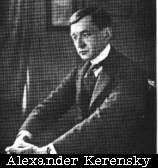The Russian Revolution: March, 1917
World War I broke out in 1914. Lenin spent the war years in exile, brooding over how carry out his slogan: "Turn the imperialistic war into civil war." His antipathy towards the rest of the European socialist movement turned into hatred when, contrary to their internationalist pledges, the socialists of almost every belligerent country loyally voted to support the war efforts of their respective nations. At the same time, this left disaffected anti-war wings of the European socialist parties who would become a fruitful pool of recruits for the Bolsheviks.
Lenin and most of his associates either lived in foreign exile in neutral countries, or languished in the Czar's Siberian prisons. Few of them were present to even participate in, let alone lead, the first Russian Revolution which occurred in March of 1917. The March revolution forced the Czar to abdicate, established freedom of the press, and granted a blanket amnesty to political prisoners in Siberia - including terrorists. A much freer Russia seemed to be on the horizon. But ironically, liberalization inadvertently summoned back to Russia a small army of Bolsheviks from the far corners of the planet, often (as in Lenin's case) with transportation paid by the German Kaiser:
| Bolshevik Leaders | Location |
| Lenin | Switzerland |
| Radek | Switzerland |
| Zinoviev | Switzerland |
| Bukharin | New York |
| Litvinov | London |
| Antonov-Ovseenko | paris |
| Dzerzhinsky | Moscow |
| Latsis | Petrograd |
| Molotov | Petrograd |
| Kirov | Vladikavkaz |
| Stalin | Kureika (Siberia) |
| Ordzhonikidze | Pokrovsk (Siberia) |
| Sverdlov | Turukhansk (Siberia) |
| Kamenev | Achinsk (Siberia) |
| Rykov | Narym (Siberia) |
| Trotsky | New York |
| Chicherin | London |
| Uritsky | Stockholm |
After the Czar's abdication, power passed to a Provisional Government appointed by a temporary committee of the Duma, which proposed to share power to some extent with councils of workers and soldiers known as "soviets." Following a brief and chaotic period of fairly democratic procedures, a mixed body of socialist intellectuals known as the Ispolkom secured the right to "represent" the soviets. The democratic credentials of the soviets were highly imperfect to begin with: peasants - the overwhelming majority of the Russian population - had virtually no say, and soldiers were grossly over-represented. The Ispolkom's assumption of power turned this highly imperfect democracy into an intellectuals' oligarchy. As Pipes explains, the Ispolkom "was not representative of the workers and soldiers, for its members were not elected by the Soviet but, as in 1905, nominated by the socialist parties. Members of the Ispolkom represented not workers and soldiers but their respective party organizations, and could be replaced at any time by others of these parties." In short, "Rather than serving as the executive organ of the Soviet, therefore, the Ispolkom was a coordinating body of socialist parties, superimposed on the Soviet and speaking in its name." (The Russian Revolution)
